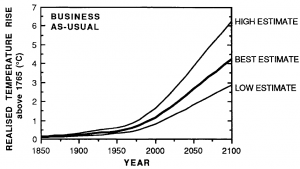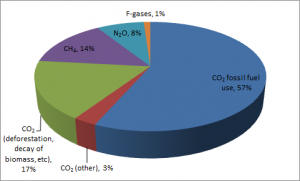Dickinson to Durban » Climate Change » The Thin Line
The Thin Line
By Sam Pollan 14′
Reducing emissions is a long and arduous task that cannot be completed overnight. This does not mean we can sit back and wait to hit the peak and then we will start reducing emissions. We need to develop national and international protocols immediately so that as we peak we can achieve the steep reductions necessary to prevent dangerous anthropogenic warming.
Scientific estimates indicate that while emissions are still growing, without serious reductions over time we will exceed targeted GHG levels. Time is not on our side in this issue. Most scientists say that emissions must peak within ten or twenty years in order to reduce drastic climate change, or worse, require large sums of money to pay for damages caused by climate change. That being said, it is important that while countries must take initiative soon, waiting for a prime moment to invest in green technologies can provide the best results with minimal impact to the economy.
One advantage of starting investments early is an increased potential gain. Kenneth Arrow
writes that abatement costs now will cost approximately one percent of GNP. While this initial cost is high, it can yield net benefits to the economy as markets shift towards more energy efficient technology. Furthermore, the main benefits of mitigation are avoiding future damages that would occur if the business as usual (BAU) curve comes to fruition.
Another important aspect to evaluate when discussing mitigation techniques is when the change will actually bring about results. Carbon stays in the atmosphere for centuries so it is important to stop large sources of GHG emissions now and worry about smaller sources as time goes on. Stopping unnecessary deforestation is one of a number of key issues in the issue of timely action. Deforestation accounts for roughly 17% of GHG emissions. Repopulating forests can absorb CO2 from the atmosphere; however, it takes decades, even centuries to trap the gas.
Restructuring society into a less carbon intensive environment is a difficult task and must be confronted with fervor. While nations need to invest in the technology, they need to approach investment at the thin line between acting before the economy can sustain the investment and waiting too long. Nations must also commit to long-term emissions commitments soon for everyone’s benefit. Without considering all of the previous factors in detail, climate change will be inevitably drastic.
Filed under: Climate Change · Tags: BAU, deforestation, GHG, Kenneth Arrow, Sam Pollan










Recent Comments